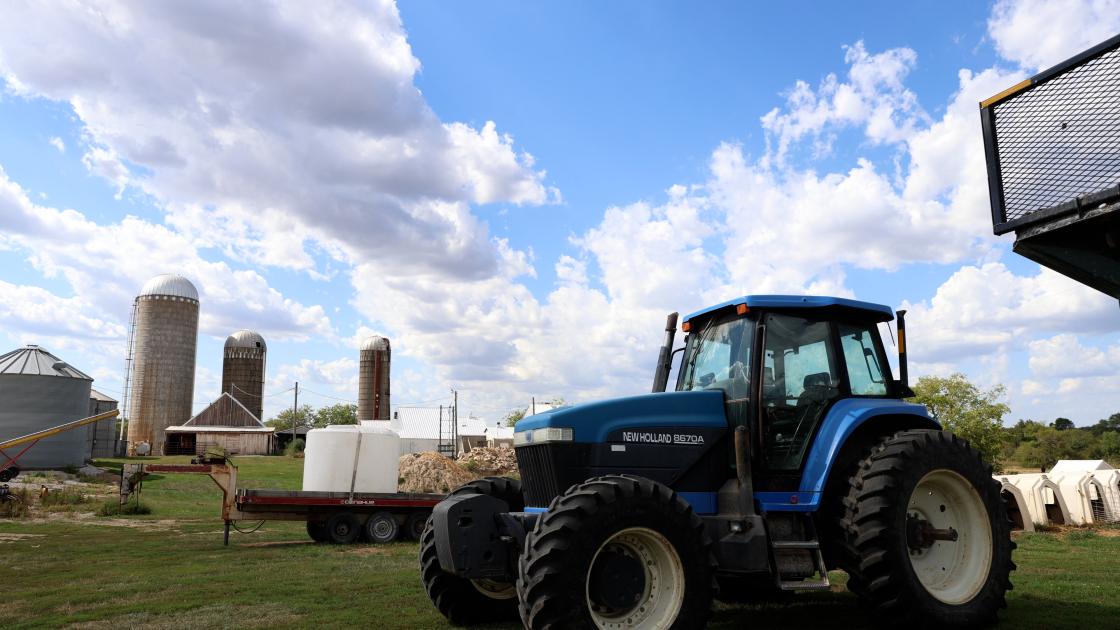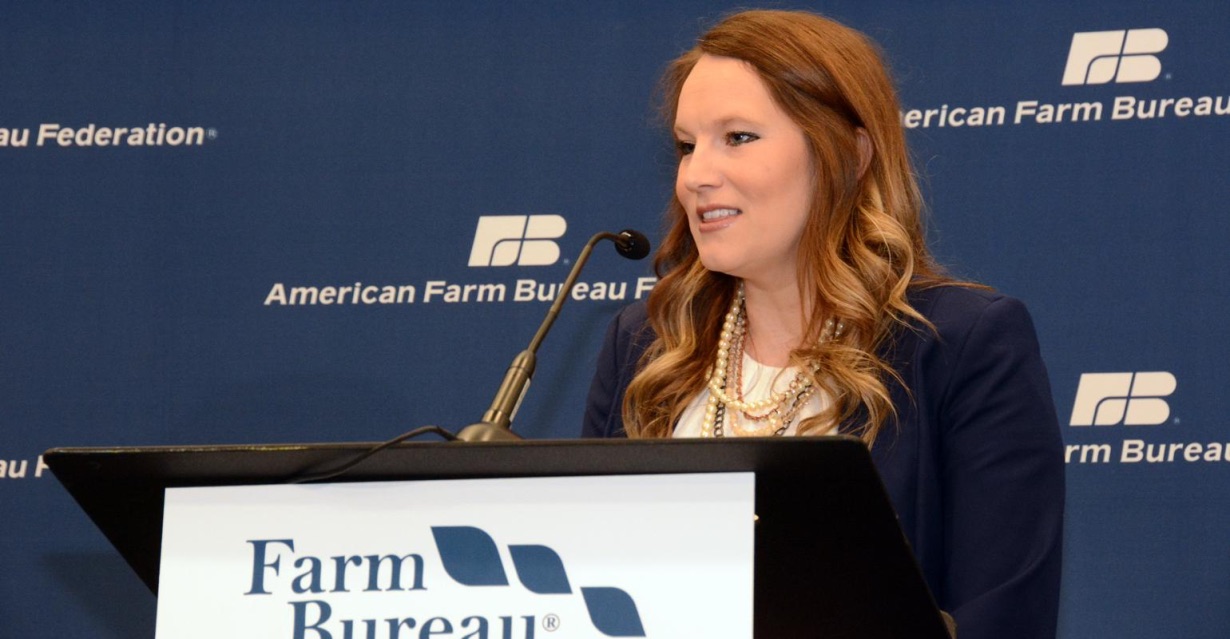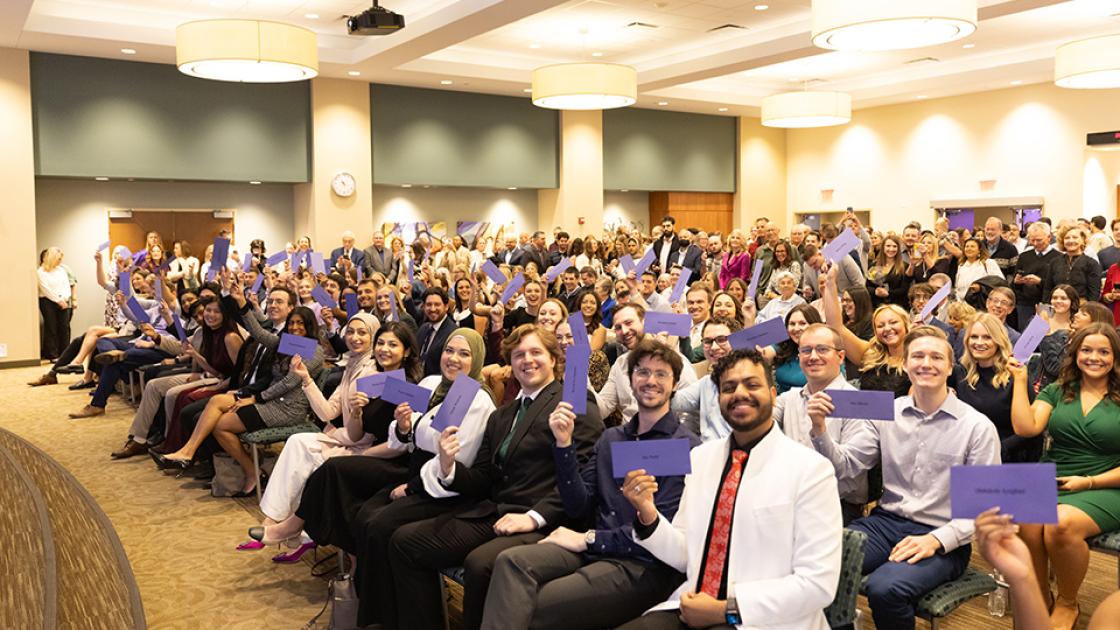
Plant one seed
5 questions with agricultural mental health specialist and podcaster Adrienne DeSutter

Adrienne DeSutter is a farm wife and mother on her husband's fourth-generation farm in western Illinois. She hosts the podcast “Wellness in the Fields,” which focuses on mental health topics affecting Illinois’ agricultural community. The episodes are available online and through Spotify as part of the Farm Family Resource Initiative (FFRI), a group of programs coordinated by SIU’s Center for Rural Health and Social Service Development (CRHSSD).
In addition to podcasting and public speaking, DeSutter creates and connects ag mental health resources through writing, consulting, and social media (@SowHopeGrowHope) as part of her Sow Hope Grow Hope initiative.
We turned the microphone around to ask the podcaster five questions.
How did your upbringing lead to your current role as a “director of tough talks” for Wellness in the Fields?
I grew up in a rural community [Cambridge, Ill., population ~2,100 in Henry County] without having much involvement with agriculture. We were surrounded by farm fields, but even through high school, I couldn't have told you what was growing in them! I met my husband 13 years ago and farming soon became a major part of my life. When you marry into a farm family without having grown up on a farm, you come in with a different set of eyes; a different perspective. Farm families are dealing with a set of unique stressors that other people might not understand.
Until having our first child, I worked as a school counselor after earning a Master’s Degree in Counseling. I intended to stay home while my kids were young and then return to school counseling, but a series of events changed my path: we tragically lost a close friend, we’d just had our second child, our farm was going through major changes, and then we lost a family friend to suicide. Even despite this sequence of challenging events, we were dealing with a lot of the typical turmoil and personal stress that often accompanies “farm life.” Knowing how hard it was for us to take control of our chaos, I thought, “I know there are other farm families going through this, and I hope they know they aren’t alone.” So I reached out to the Illinois Farm Bureau and started doing some writing and workshops locally, which quickly evolved into working with organizations — the Farm Family Resource Initiative being one — throughout the country. Apparently, it’s unique to be a mental health professional and be involved in agriculture!
Often after a webinar or workshop, I’d hear “you should really do a podcast!” So when FFRI pitched the idea to me, I figured I ought to give it a try, even though I had never even listened to a full podcast episode! That may have helped, though, because I really didn't want to come across as a pro. I wanted to come at it as a person—someone relatable who is going through similar things that many in farming have experienced. I wanted it to feel more like you’re talking with a friend who happens to know a little bit about mental health.
Mental health is a broad, complicated topic. Layer in the farming aspect and it becomes even more complex. How do you decide on what to discuss in your podcasts?
Mental health topics are extremely diverse. I could talk for days on all the different subjects that relate to mental health and agriculture. I like to speak on issues I'm either going through personally or things I'm hearing about out in the fields, from people at conferences, from friends and family and people I know. I'm in different Facebook groups and I work with a lot of different organizations. I’m always keeping an ear open for concerns that sound like a pattern in these circles.
Your target audience is farmers, who by nature are self-reliant and tough. How does this influence your approach to discussing things like self-care and sharing concerns?
My approach is sort of unfiltered. I try to acknowledge that those traits are common; they’re part of what makes us good farmers. But to some extent, they can also be a barrier to asking for help or recognizing when enough is enough. Yeah, we're tough people; we can work long hours, fix all sorts of equipment, and troubleshoot constant conflicts. But let’s use that strength to do other tough things, like acknowledging when there’s too much on our plate, or recognizing that our family needs us more than our farm does sometimes. We might be excellent at managing the farm, but can we also be excellent at managing ourselves? For the farm to function, the farmer has to understand that they’re a priority, too.
In your career, have you noticed any societal shift in mental health awareness, in dealing with these issues nationally or specifically within the ag sector?
If there is a silver lining to COVID-19, it is that the entire world started to think more about mental health, behavioral health and taking better care of ourselves. We started hearing about particular stressors — isolation, financial worries, uncontrollables and uncertainties, and the dynamic of working closely with family — that agriculture has been experiencing all along. The nation said, “Hey, these are really hard things to deal with, and they will take a toll on you, and you’ve got to slow down and take a proactive approach to keep yourself healthy.” But this is just how farmers live, and oftentimes we’re not taking that proactive approach or paying attention to our stress until we’re in too deep.

A 2021 American Farm Bureau Federation report said 92% of farmers and farmworkers now feel comfortable talking to someone who’s going through a hard time, which is an increase of 22% since 2019, so we've made some strides and are going in the right direction. However, many farmers and ag business folks still talk about how challenging it is to pick up the phone and call for help, or try to take a break when they need it. They don't feel comfortable because aside from knowing how much work still needs to be done, they fear the farmer next door or a family member is going to judge them. There is still work to do to help people understand how to set personal boundaries and advocate for themselves so they can be the best, healthiest farmers that they can be.
What motivates you?
From the time I started advocating five years ago, it’s been extremely powerful to see just how big of an impact one small thing can have. That's kind of what I preach now, through my initiative “Sow Hope Grow Hope.” You go out and plant one seed — take one small step to break down the stigma behind mental health — and see how it cultivates growth in those around you. Maybe it’s sharing a social media post about a mental health event, which leads to a friend feeling more comfortable talking to you about stress. Or maybe it’s laying a mental health article out for your grumpy grandpa to see, encouraging him to take a break. It could be talking more about your own experience with a therapist, or standing firm in your boundary of leaving the farm at a certain time, or just asking someone about their day.
There are all sorts of ways that you can “plant one seed.” It's been amazing to see how much those little efforts have grown and how much people have talked to me about the changes they've seen in their lives and in the people around them. I’m most motivated just knowing that every seed I plant encourages growth in our agricultural community.
Check out the FFRI’s Wellness in the Fields podcast online and on Spotify.



